Trump’s first year: conservative feats despite chaos
Donald Trump’s behaviour obscures the fact that in just one year, he has achieved more for conservatives than even he expected.
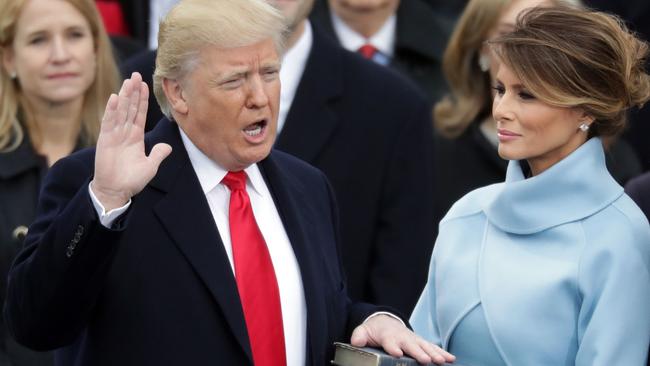
It began a year ago today with a dark, apocalyptic inauguration speech that spoke of a broken America, of rusted factories dotting the nation like “tombstones” and of “American carnage”. Donald Trump promised to be the outsider president, the populist billionaire working for the “forgotten men and women” of Middle America to restore its greatness.
A year on, it feels as if nothing in American politics will ever be the same again. Trump has redefined the very notion of the US presidency with his instinctive, unique and often shocking brand of confrontation politics. Wielding Twitter like a weapon, he has coined a new language from “Little Rocket Man” to “fake news”, scorching his perceived enemies, great and small, like no president before. And those he sees as standing in his way, from former FBI chief James Comey to his embittered former chief strategist Steve Bannon, he has simply sacked.
To his critics, such as Republican senator Jeff Flake, Trump’s style has denigrated the dignity of the presidency.
“2017 was a year which saw the truth — objective, empirical, evidence-based truth — more battered and abused than any other in the history of our country, at the hands of the most powerful figure in our government,” Flake told the Senate this week.
“An American president who cannot take criticism — who must constantly deflect and distort and distract, who must find someone else to blame , is charting a very dangerous path.”
Trump supporters are frustrated by the attention given to his personal foibles, but as The Economist puts it: “Given how much rests on the man’s shoulders, and how ill-suited he is to the presidency, the focus on Trump’s character is both reasonable and necessary.”
Yet many of Trump’s critics, including in the mainstream US media, cannot bring themselves to look past his character flaws and the lurid tales of White House dysfunction as told in the fast and loose inside account of Michael Wolff’s Fire and Fury. If they did, they would see something that almost no one — least of all Trump — expected when he was inaugurated a year ago. Which is that he is turning out to be a much more traditional and conservative Republican president than his fiery populism during the 2016 campaign trail suggested.
There has been no foreshadowed trade war with China, no unravelling of the North American Free Trade Agreement, and no retreat from foreign battlefields. Bannon, the architect and key driver of Trump’s populism, has been banished not only from the White House but from his Breitbart conservative pulpit. Old-style Republicans are now the loudest voices inside the West Wing.
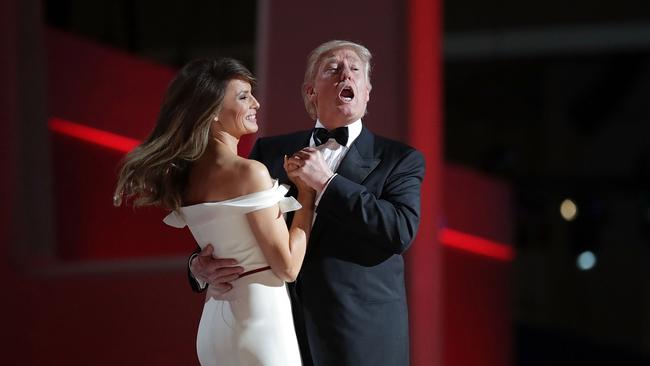
Trump’s achievements so far as President are the kind that traditional Republicans love — lower corporate and personal taxes, tighter border control, a more conservative Supreme Court, the scrapping of environmental and other regulatory red tape, withdrawal from the Paris Agreement, tougher on terror, and a more hawkish approach to rogue regimes of the North Korean, Syrian and Iranian variety.
“For the past year, he’s done pretty much everything conservatives could have wanted,” says Matt Schlapp, chairman of the American Conservative Union. “In the past Republican presidents have done conservative things to appeal to the base and then done not-so-conservative things to try to broaden their appeal. They’ve kind of ping-ponged. Trump has really doubled down.”
As author and political commentator David Brooks notes: “It’s almost as if there are two White Houses. There’s the Potemkin White House, which we tend to focus on: Trump berserk in front of the TV, the lawyers working the Russian investigation and the press operation. Then there is the Invisible White House that you never hear about, which is getting more effective at managing around the distracted boss.”
When Senate majority leader Mitch McConnell sat down with Trump and other Republicans at Camp David recently to chart their course for this year, McConnell — a political veteran of more than 30 years — described the last 12 months as “the most consequential year” in his political career. “Last year would be a tough one to top,” he said.
As he enters his second year in office, Trump’s most powerful weapon against his political opponents is the growing strength of the US economy. Like Bill Clinton in the 1990s, Trump is blessed to have taken office at a time when the economic cycle is favourable to him. Wall Street is enjoying a boom, unemployment has dropped to a 17 year low of 4.1 per cent, almost 200,000 new manufacturing jobs were created last year and the economy is expected to grow at 2.6 per cent this year.
Trump cannot take all the credit for this, presidents have only limited influence on the business cycle — Wall Street was hitting record highs under Barack Obama also, and the economic and job growth was already on the upswing a year ago. But Trump can take credit for encouraging these economic trends by introducing an unashamedly pro-business approach to the economy. His signature achievement as President — a $US1.5 trillion tax package that takes corporate rates from 35 per cent to 21 per cent and gives sweeping cuts to the middle class — will further spur growth and jobs.
The tax package was the biggest since the Reagan era and was the most consequential tax law introduced in the US in more than 30 years. It may end up being Trump’s greatest legacy.
To the ire of Democrats and environmentalists, Trump’s pro-business agenda has included slashing Obama-era regulations, especially on environment and energy, approving stalled oil pipelines, talking up the troubled coal industry and demoting the national debate on climate change.
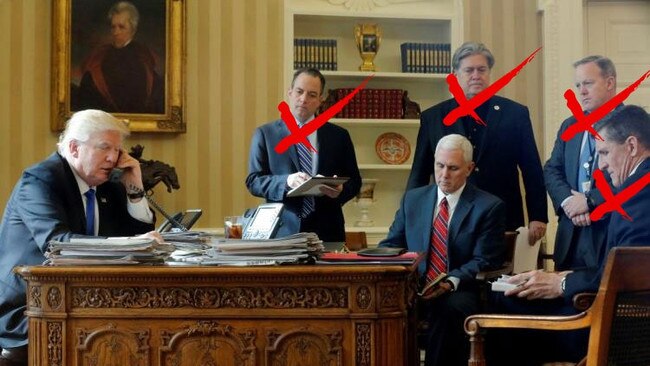
Trump has also largely achieved his stated aim of cracking down on illegal immigration despite his failure so far to secure funding from either congress or from Mexico for his promised $US22 billion border wall with Mexico. He maintains the wall will be built, despite conceding this week that it will not be a continuous wall from coast to coast because of natural barriers that are just as effective. Amid claims he was watering down his original concept, Trump tweeted this week: “The Wall is the Wall, it has never changed or evolved from the first day I conceived of it. (It) will be paid for, directly or indirectly ... by Mexico.”
But while Trump’s wall is still years away, his tough rhetoric on illegal immigrants has had the desired effect. The number of people trying to illegally enter the US from Mexico has fallen to the lowest level in 46 years according to figures released last month by Homeland Security. Meanwhile, a crackdown on illegal immigrants inside the US shows 110,568 arrests, a 42 per cent increase between Trump’s inauguration and the start of October.
Yet alongside Trump’s conservative victories there have also been big stumbles. The failure of the President and the Republican-dominated congress to agree on a repeal of the Affordable Care Act, dubbed Obamacare, was a self-inflicted defeat that has left millions of Americans in no-man’s land on health insurance, clinging to a weakened Obamacare and fearful of what comes next.
This disassembling of Obamacare without a viable replacement would leave 23 million to 32 million more Americans uninsured over the coming decade, according to nonpartisan congressional reports. These figures have spooked Republicans, who fear a voter backlash if Obamacare is repealed.
Even without a formal repeal, the White House is seeking to slowly dismantle Obamacare through piecemeal cuts. The result is that at the end of 2017, 12.2 per cent of US adults lacked health insurance, up from 10.9 per cent at the end of 2016 — the first increase in uninsured adults since 2008.
Trump’s biggest mistake as President has been his decision to sack FBI chief Comey over the Russia investigation which he was presiding over. The sacking sparked a series of events that have cast a shadow over Trump and the White House ever since.
It prompted a wounded Comey to make the bombshell public claim that Trump had asked him to drop the FBI’s investigation into former national security adviser Michael Flynn. This, in turn, led to the appointment of special counsel Robert Mueller, guaranteeing a far larger and wider investigation.
Now Mueller is looking at more than Russia’s attempts to influence the 2016 election in favour of Trump. He is also examining whether Trump’s dealings with Comey amounted to obstruction of justice and whether Trump or anyone in his camp colluded with Russia during the campaign and transition period. So far, there is no public evidence of collusion and while Trump can expect a toughly worded report from Mueller this year, as things stand it seems unlikely that it would ultimately lead to the impeachment proceedings that Democrats are hoping for.
On foreign policy, with the exception of his wild tweets about North Korea’s Kim Jong-un, Trump has been less disruptive and more conventional than many expected. Although he attracted ire, including from Australia, by withdrawing from the Trans-Pacific Partnership, he has made no attempt to rewrite NAFTA and has not carried out his campaign threat to invoke sweeping trade sanctions against China for its trade surplus with the US.
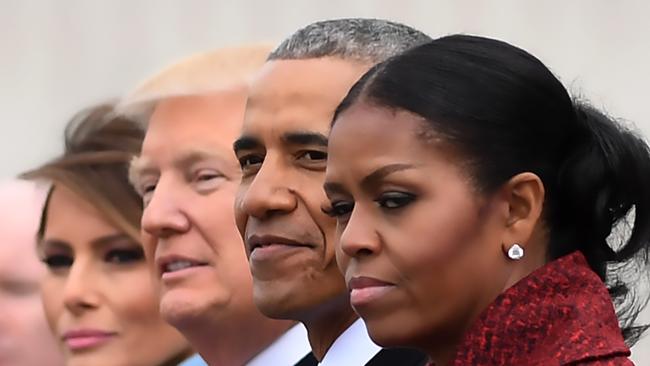
Instead, Trump has developed a personal rapport of sorts with Chinese President Xi Jinping, if only because he now needs China to aid efforts to curtail North Korea’s fast-growing nuclear and missile program. Although the White House is expected to announce limited trade measures against China within weeks, these are expected to fall far short of the 45 per cent tariffs on Chinese exports to the US which Trump proposed on the campaign trail.
But there has been nothing traditional about the way Trump has dealt with North Korea as the regime closes in on the capability to launch a nuclear attack on the US. Trump’s aggressive rhetorical war with Kim, including calling him “Little Rocket Man” and “short and fat”, and boasting that he has a bigger nuclear button than the North Korean leader, has led to Trump being accused of a cavalier approach to the greatest security threat facing the US. Yet the outcome of such rhetoric has been to push China to take the stand-off between Pyongyang and Washington more seriously. Beijing has agreed to the most sweeping UN sanctions against North Korea — a position it might not have adopted without US provocation.
While Trump’s statements on North Korea have rattled some in the region, there is no sign his administration is paying less attention to Asia than Barack Obama did under his much heralded “pivot”. Trump’s longest overseas visit as President has been to Asia and he has pledged to boost the strength of the US Pacific fleet as part of an overall build-up of US military power.
As far as Australia is concerned, with the exception of the TPP decision there is little change in the relationship. At their meeting in New York in May, Trump and Malcolm Turnbull made a good public show of having overcome their differences after their fractious first phone call, when Trump complained about the refugee deal struck in the dying days of the Obama administration. That deal is now proceeding. The military, economic, and diplomatic ties between the two countries have not been shaken by the unconventional style of the Trump administration even though Washington has been slow to appoint an ambassador to Canberra.
In the Middle East, Trump has adopted traditionally hawkish positions by stepping up criticism of Iran and especially of Obama’s nuclear deal; firing missiles against the forces of Syria’s Bashar al-Assad and recognising Jerusalem as Israel’s capital. He has also overseen the final defeat of Islamic State on the battlefield with the fall of Mosul in Iraq and Raqqa in Syria. It is a victory Trump can take some credit for, even though the jihadist force was already in rapid retreat when he took over.
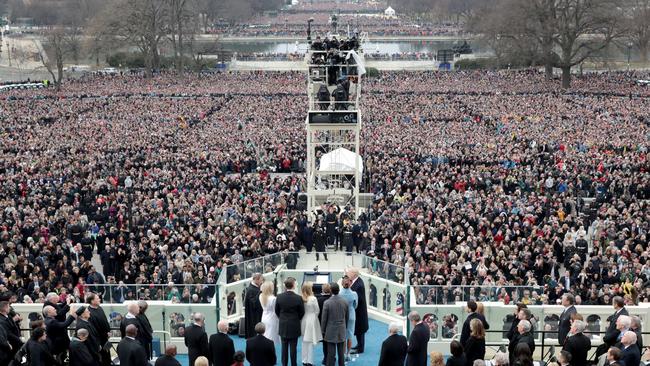
In Afghanistan, Trump has also adopted a conventional approach. The President, who came into office wanting to pull all US troops out of the country, was persuaded by Defence Secretary James Mattis to boost US troop levels instead, because of the risk of the country once again becoming a sanctuary for terrorists.
Yet, will it all matter for Trump? Despite the growing health of the economy and his historic tax bill, there has been no bounce in the President’s approval ratings, which are mired in the upper 30s — the lowest of any president at this stage of his term since polling began more than 75 years ago.
Trump’s base has largely stuck by him, with 85 per cent of Republicans continuing to support him. But unless his popularity improves, the Republicans face a devastating protest vote in the November midterm elections, risking Republican control of the house and the Senate, and therefore Trump’s ability to prosecute his agenda as president.
Trump’s problem after a year in office is his style rather than his record. The dominant public image of his presidency remains one of chaos. This is despite the fact that Trump’s White House is now a more sensible place, with the installation of former general John Kelly as chief of staff and the continued sobering influence of Mattis, national security adviser HR McMaster and Secretary of State Rex Tillerson.
The media has played up this image of chaos and dysfunction, and Trump provides it with endless fodder when he tweets that he is a “stable genius” and sends his doctor out to tell everyone that he passed a cognitive test with flying colours. Trump’s erratic behaviour as President obscures the fact that during his first tumultuous year in office, he has arguably achieved more for American conservatives than any president since Reagan.
Cameron Stewart is also US contributor for Sky News Australia.




To join the conversation, please log in. Don't have an account? Register
Join the conversation, you are commenting as Logout